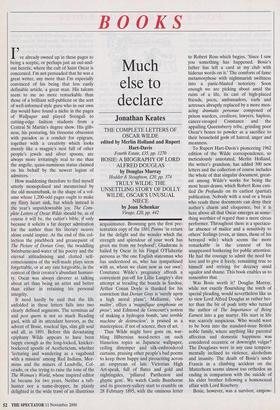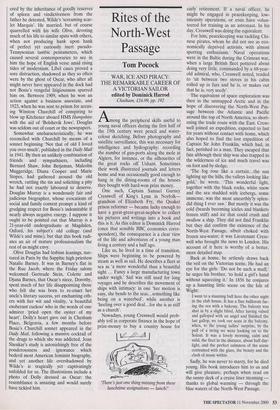BOOKS
Much else to declare
Jonathan Keates
Iye already owned up in these pages to being a sceptic, or perhaps just an out-and- out heretic, where the cult of Saint Oscar is concerned. I'm not persuaded that he was a great writer, any more than I'm especially convinced of his being that less easily definable article, a great man. His talents seem to me no more remarkable than those of a brilliant self-publicist or the sort of well-informed style guru who in our own day would have found a niche in the pages of Wallpaper and played Svengali to cutting-edge fashion students from a Central St Martin's degree show. His glib- ness, his posturing, his tiresome obsession with paradox as a conduit for epigram, together with a creativity which looks merely like a magpie's nest full of other people's jewels and silver spoons, are always more irritatingly real to me than the angelic, quasi-numinous status claimed on his behalf by the newest legion of admirers.
How maddening therefore to find myself utterly monopolised and mesmerised by the old mountebank, in the shape of a vol- ume whose 1,200-odd pages ought to make my flinty heart sink, but which instead is the year's unputdownable joy. The Com- plete Letters of Oscar Wilde should be, as of course it will be, the cultist's bible, if only because it solicits a far deeper admiration for the author than his literary oeuvre alone could inspire. At the end of this col- lection the pinchbeck and greasepaint of The Picture of Dorian Gray, the twaddling Swinburne-and-water of his poetry and the eternal attitudinising and clotted self- consciousness of the well-made plays seem forgettable, or at any rate forgivable, in the context of their creator's abundant humani- ty. Oscar was always cleverer at talking about art than being an artist and better than either in retaining his personal integrity.
It need hardly be said that the life unfolded in these letters falls into two clearly defined segments. The terminus ad and post quem is not so much Reading gaol, with all its attendant horrors, as the advent of Bosie, roseleaf lips, slim gilt soul and all, in 1891. Before this devastating epiphany Wilde appears to have been happy enough as the long-locked, knicker- bockered apostle of Aestheticism, whether 'lecturing and wandering as a vagabond with a mission' among Red Indians, Mor- mons and the miners of Leadville, Col- orado, or else trying to raise the tone of the The Woman's World, whose inspired editor he became for two years. Neither a tuft- hunter nor a name-dropper, he plainly delighted in the wide trawl of an illustrious acquaintance. Browning gets the first pre- sentation copy of the 1881 Poems `in return for the delight and the wonder which the strength and splendour of your work has given me from my boyhood'; Gladstone is hailed by Oscar in his Fingal O'Flahertie persona as 'the one English statesman who has understood us, who has sympathised with us, whom we claim now as our own'; Constance Wilde's pregnancy affords a convenient put-off for Lillie Langtry's dire attempt at treading the boards in Sardou; Arthur Conan Doyle is thanked for his conviction that Dorian Gray is 'surely upon a high moral plane'; Mallarme„ 'cher maitre', offers a `rnagnifique .symphonie en prose'; and Edmond de Goncourt's notion of making a hydrogen bomb, 'une terrible machine de destruction', is praised as a masterpiece, if not of science, then of art.
Thus Wilde might have gone on, war- bling Hibernian wood-notes on such blameless topics as Japanese wallpaper, ceiling distemper and silk-embroidered curtains, praising other people's bad poems to keep them happy and pirouetting across an empyrean of late Victorian High Art-speak, full of flutes and gold and nightingales, 'pillared Parthenon and glyptic gem'. We watch Castle Bunthorne and its greenery-yallery start to crumble on 28 February 1895, with the ominous letter to Robert Ross which begins, 'Since I saw you something has happened. Bosie's father has left a card at my club with hideous words on it.' The comforts of fame metamorphose with nightmarish swiftness into a panic-blasted notoriety. Soon enough we are picking about amid the ruins of a life, its cast of high-placed friends, poets, ambassadors, earls and actresses abruptly replaced by a more men- acing dramatis personae composed of prison warders, creditors, lawyers, hapless, cancer-ravaged Constance and the appalling Queensberry tribe, grinding poor Oscar's bones to powder as a sacrifice to their household gods of hatred, anger and meanness.
To Rupert Hart-Davis's pioneering 1962 edition of the Wilde correspondence, so meticulously annotated, Merlin Holland, the writer's grandson, has added 300 new letters and the collection of course includes the whole of that singular document, great- est among Wilde's works for being the most heart-drawn, which Robert Ross enti- tled De Profundis on its earliest (partial) publication. Nobody with a soul or a brain who reads these documents can deny their author's charm and eloquence, but it is here above all that Oscar emerges as some- thing worthier of regard than a mere circus performer. Throughout there is a spectacu- lar absence of malice and a sensitivity to others' feelings (even, at times, those of his betrayed wife) which seems the more remarkable in the context of his unappeased hankering for public attention. He had the courage to admit the need for love and to give it freely, remaining true to himself and striving for decency amid squalor and shame. This book enables us to remember that.
Was. Bosie worth it? Douglas Murray, while not exactly flourishing the torch of special pleading, would nevertheless like us to view Lord Alfred Douglas as rather bet- ter than the bit of posh totty who turned the author of The Importance of Being Earnest into a gay martyr. His start in life was scarcely auspicious. Who would want to be born into the standard-issue British noble family, where anything like parental affection and domestic happiness was considered eccentric or downright vulgar? The Douglases were in any case tempera- mentally inclined to violence, alcoholism and insanity. The death of Bosie's uncle Francis in a climbing accident on the Matterhorn seems almost too orthodox an ending in comparison with the suicide of his elder brother following a homosexual affair with Lord Rosebery.
Bosie, however, was a survivor, empow- ered by the inheritance of goodly reserves of spleen and vindictiveness from the father he detested, Wilde's 'screaming scar- let Marquis'. He married, but of course quarrelled with his wife Olive, devoting much of his life to similar spats with others, when not producing hank upon hank of perfect yet curiously inert pseudo- Tennysonian iambic pentameters, which caused several contemporaries to see in him the hope of English verse amid rising tides of modernism. Libel cases proved a sore distraction, shadowed as they so often were by the ghost of Oscar, who after all might never have appeared in the dock had not Bosie's vengeful litigiousness spurred him on. Between 1909, when he won an action against a business associate, and 1923, when he was sent to prison for accus- ing Winston Churchill of conspiring to blow up Kitchener aboard HMS Hampshire with the aid of 'Bolshevik Jews', Douglas was seldom out of court or the newspapers.
Somewhat uncharacteristically, he was reconciled with Churchill by means of a sonnet beginning 'Not that of old I loved you over-much', published in the Daily Mail in 1941. By then an unlikely combination of friends and sympathisers, including Bernard Shaw, John Betjeman, Malcolm Muggeridge, Diana Cooper and Marie Stopes, had gathered around the old wretch, rattling the tin and soliciting a pity he had not exactly laboured to deserve. Douglas Murray is a wondrously fair and judicious biographer, whose evocations of social and family context prompt a kind of grudging respect for Bosie's indomitable if nearly always negative energy. I suppose it ought to be pointed out that Murray is a 21-year-old undergraduate at Magdalen, Oxford, his subject's old college (and Wilde's and mine), but that this book radi- ates an air of mature professionalism the rest of us might envy.
Olive Douglas had lesbian leanings, nur- tured in Paris by the Sapphic high priestess Natalie Barney. It was in Barney's flat in the Rue Jacob, where the Friday salons welcomed Gertrude Stein, Colette and Djuna Barnes, that Oscar's niece, Dorothy, spent much of her life disappointing those who felt she was born to re-enact her uncle's literary success, yet enchanting oth- ers with her wit and vitality, 'a beautiful exuberant cuckoo' who in the words of one admirer 'pried open the oyster of my heart'. Dolly's heart gave out in Chesham Place, Belgravia, a few months before Bosie's Churchill sonnet appeared in the Daily Mail, following a massive cocktail of the drugs to which she was addicted. Joan Shenkar's study is astonishingly free of the ponderousness and ignorance which bedevil most American feminist biography, and yet another life overshadowed by Wilde's is tragically yet captivatingly unfolded for us. The illustrations include a photo of Dolly dressed as Oscar: the resemblance is amazing and would surely have tickled him.



























































































 Previous page
Previous page